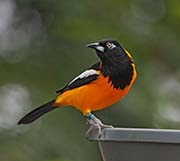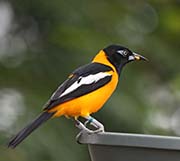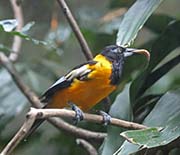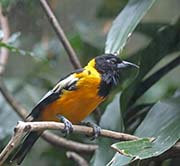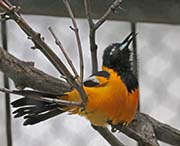Venezuelan Troupial - Iceterus icterus
| Length | |
| Weight | |
| Clutch Size | |
| Chicks at birth | |
| IUCN Conservation Status | |
Continents: |
The Venezuelan Troupial is the national bird of Venezuela and is considered a 'New World Oriole'. It is found in parts of South America and the Caribbean. There are three subspecies.
Venezuelan Troupials are orange with a black head which extends to the breast ending in a saw-toothed pattern, black shoulders, black tail and a large bulky black bill. Their wings are also black with a white streak that is visible when their wings are closed. Their eyes are yellow and behind them is a patch of naked blue skin. Both sexes are similar.
Diet: Their diet consists of insects, fruit, small birds and eggs.
Courtship: No information found.
Nesting: Venezuelan Troupials do not build their own nests but either use a vacant nest or evict the adults of an active nest. If there are eggs or nestlings in the active nest, they will eat them.
Habitat and Range: They are found in Colombia, Venezuela, and the Caribbean islands of Aruba, Curacao, Bonaire and Puerto Rico. They inhabit dry woodland, shrubland, plains and savannas.
Vocalization: They produce a loud clear song.
Plumage/Molt: Probably molt annually.
Migration: Not migratory.
Tongue/feet: Black legs and feet.
Bibliography:
- http://en.wikipedia.org The Free Encyclopedia, Accessed June, 2013
- Ridgely, Roberts S. and Tudor, Guy, Field Guide to the Songbirds of South America: The Passerines,University of Texas Press, 2009
